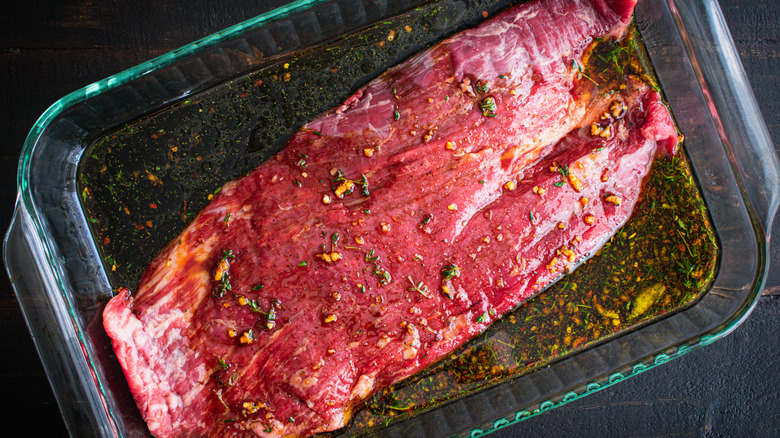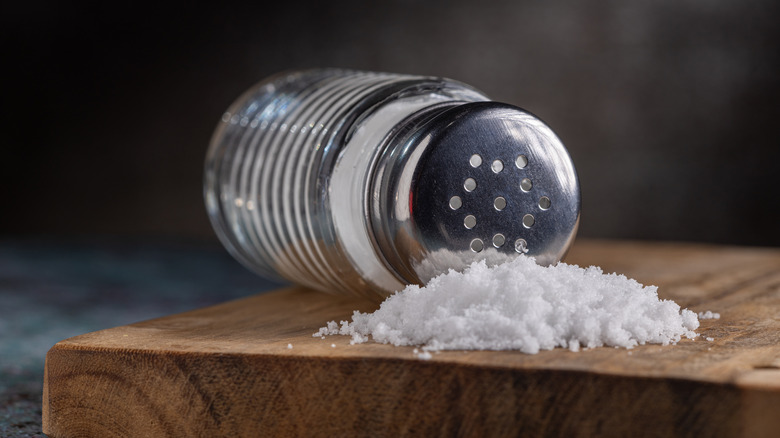When Mixing A Marinade, Go Easy On The Salt
A good marinade has a delicate balance of three elements: Acid like citrus juice to tenderize the protein, fat such as oil to help it absorb flavor, and seasonings like salt that enhance the flavor. Adding too much of any element can throw off your marinade, but it's even more important to be careful when you're working with ingredients like salt that do more than just bring flavor.
K.C. Gulbro — owner of FoxFire Restaurant and Copper Fox event venue, and Chef Ambassador for Certified Angus Beef® — tells Food Republic that, "It's important to consider the ingredients and their effects on the meat." Flavor aside, salt is added to marinades because it helps to draw out the moisture that's present inside meat-based proteins. It may seem counterintuitive at first, but there is science to it. Proteins begin to absorb moisture back in once they are dry, which means that they will eventually soak up the liquidy marinade. This allows the flavors of the marinade to penetrate even further, giving depth and complexity to the proteins which they would otherwise lack.
However, Gulbro warns: "Ingredients high in salt or acid have a stronger impact the longer the meat is marinated." Leave the protein in the marinade for too long and you risk it turning dry and tough — far from the moist, juicy, and melt-in-your-mouth deliciousness that it should be.
How long should you soak protein in salty marinades?
You might assume that the longer you leave your protein in the marinade, the more flavorful it will be, but K.C. Gulbro says that's not the case — especially when you're working with a lot of salt or acid. It's best to watch the amount of time that your protein sits in the seasoned liquid, and Gulbro also advises against marinating meat in metal containers.
In general, the USDA says that meat and poultry can be marinated for anywhere between six to 24 hours, possibly even longer. However, it all depends on the protein that you're using, and whether it's a large slab or sliced into smaller pieces.
For instance, popular cuts of meat such as chicken breasts or legs, pork chops, and steaks only really need three to four hours of marination. If you're working with bone-in chicken, you can leave it in the marinade for anywhere between two to 12 hours. On the flip side, tougher cuts of meat such as sirloin steaks can take as long as 24 hours to fully tenderize and absorb the salty marinade's flavor. The same goes for plant-based proteins such as tofu. Fish, shellfish, and vegetables are on the very other end of the spectrum — they need no more than 10 to 30 minutes of marination thanks to their already delicate texture.
The choice of salt also matters
The amount of time that the protein spends in salty marinades matters, but it's equally important to choose the right type of salt. One thing to keep in mind is that you want the salt to fully dissolve into the marinade for it to work its magic. This is why it's best to use a fine variety of salt and steer clear of flakey ones like kosher which have large crystals that don't dissolve easily. It's also a good idea to use liquid sources of salt as these will mix more evenly. For example, this basic marinade recipe uses a mix of soy sauce and Worcestershire sauce which are both packed with sodium. Or, you could even use fish sauce instead.
Once you have your salt, the next question is — how much of it do you use? The general rule of thumb is to use one part of seasoning (which includes salt), one part of acid, and three parts of fat to make a balanced marinade. You could increase the amount of salt by making your marinade closer to a brine for juicier meat of course. However, you'll want to be extra cautious about the amount of time the meat spends in the marinade when doing so. There's also the possibility that your protein might taste overly salty if you're too freehanded with the seasoning in the marinade. In that case, add more acid or sprinkle in some sugar to restore the balance.



